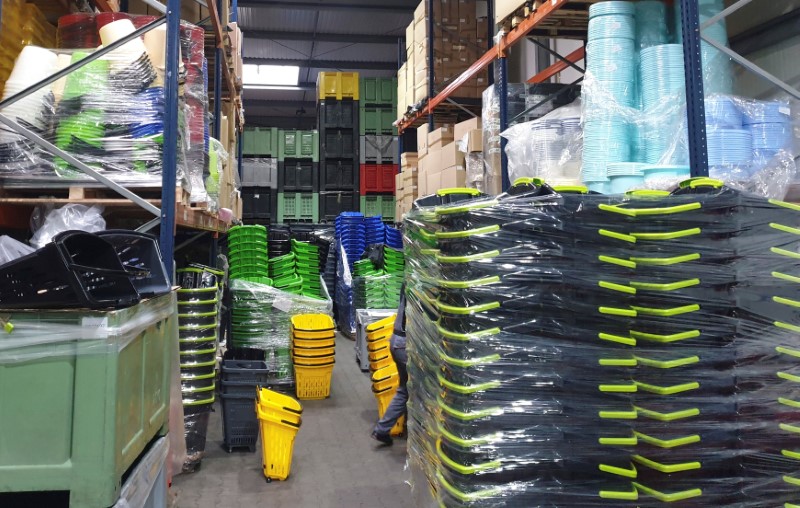By Alan Charlish
STARE MIASTO, Poland (Reuters) - Henryk Kaminski has responded to a hike in Poland's minimum wage by automating some roles at his family's plastics factory, illustrating the risks of a policy that aims to raise living standards but could push up prices and stifle jobs growth.
The ruling Law and Justice (PiS) party plans to increase the minimum monthly wage to 4,000 zlotys by the end of 2023, almost double its 2019 level, starting with a rise of over 15% to 2,600 zlotys this month.
But as workers become more expensive, some Polish firms are investing in technology to help them remain competitive.
At Kon-Plast, the factory at Stare Miasto near Konin in central Poland where the Kaminski family produces plastic containers, a newly purchased printing machine will replace two staff members on each of four teams that work shifts.
"That is a saving of eight people through implementing this type of automation," Henryk Kaminski said.
A recent study by human resources firm Randstad showed around a quarter of Polish companies employing staff on the minimum wage expect to put recruitment on hold from January, while just under a fifth are set to cut staff.
While Kon-Plast pays all its staff more than the minimum wage, it has raised salaries as a result of January's hike.
Kaminski does not plan to shed employees at the moment but said the shift to automation means an increase in the workforce of about 15% to meet demand will not now be needed.
IMPROVING LIVING CONDITIONS
Nationalist PiS, elected for a second term in October, has pledged to improve living conditions for ordinary Poles, with its flagship 500+ child benefit program winning widespread support for boosting the spending power of families.
The minimum wage increase is another step in PiS's "politics of dignity", which aims to push the buying power of Poles closer to their western European peers while shifting Poland's economic model away from one based on cheap labour.
Neighbouring Hungary and the Czech Republic have hiked their minimum wages in recent years to make up for freezes after the global financial crisis or lure back workers from abroad.
The European Union is examining a possible framework for minimum wages in the bloc, where the aftermath of the crisis and the rise of less stable forms of employment are blamed for fuelling wage inequality. In-work poverty in the 28-country EU increased from 8.1% to 9.6% between 2005 and 2018, according to the executive European Commission.
Konin shop worker Sylwia Michalak, 40, wants the minimum wage to rise faster. "It is not enough for us for everything we need. If I didn't have 500+ and child support payments it would be hard, because I'm a single mother," she said.
Andrzej Radzikowski, President of the All-Poland Alliance of Trade Unions (OPZZ) also pointed to the difficulties faced by families on low incomes.
"This minimum wage... remember it's 2,600 zlotys gross so that's less than 2,000 in your hand," he said. "So if in the family two people have the minimum wage and they have two children ... then the income of this family will be below the poverty line."
Poland's Labour Ministry did not respond to requests for comment for this story.
SOUNDING THE ALARM
While the promise of higher wages resonates with Poles, about 98% of whom earn less than the average wage in Germany according to human resources firm Sedlak & Sedlak, some warn of unwelcome side-effects.
"In short, the significant increase of the minimum wage will have a great impact on inflation ... the prices of services that employ low-skilled people will suffer, meaning an increase in prices," said Krystian Jaworski, senior economist at Credit Agricole (PA:CAGR) CIB.
Inflation in December came in at 3.4%, well above all estimates in a Reuters poll. ING analysts pointed to the upcoming minimum wage hike as a factor behind the surprise reading.
Many economists predict that inflation will rise to over 4% in the first quarter of 2020, with the effects hitting those on the lowest incomes hardest.
"I get more at work, for me it's 500 zlotys (a month)," said Daniel Nowak, 23, standing behind the counter of the Warsaw supermarket where he works.
"I can buy more things ... but also the price of goods has gone up so it's like I don't feel it all that much."
The changes could also drag on job creation.
Credit Agricole estimates that if wages rise as planned, enterprise sector employment will be 3.5% lower in 2024 than if the minimum wage had remained on its 2019 path, a difference of some 200,000 jobs.
"In the assessment of our employers' organisation ... such a sharp increase can cause entrepreneurs to try to escape into the grey zone or try to cut working hours," said Piotr Podgorski, vice president of the Polish Federation of Entrepreneurs and Employers, Przedsiebiorcy.pl.
At Kon-Plast, Henryk Kaminski plans to make lighter products that use less plastic, underscoring the factory sector's focus on savings.
"This year we are automating, for next year ... we are thinking of redesigning to get a better manufacturing cost," he said.
